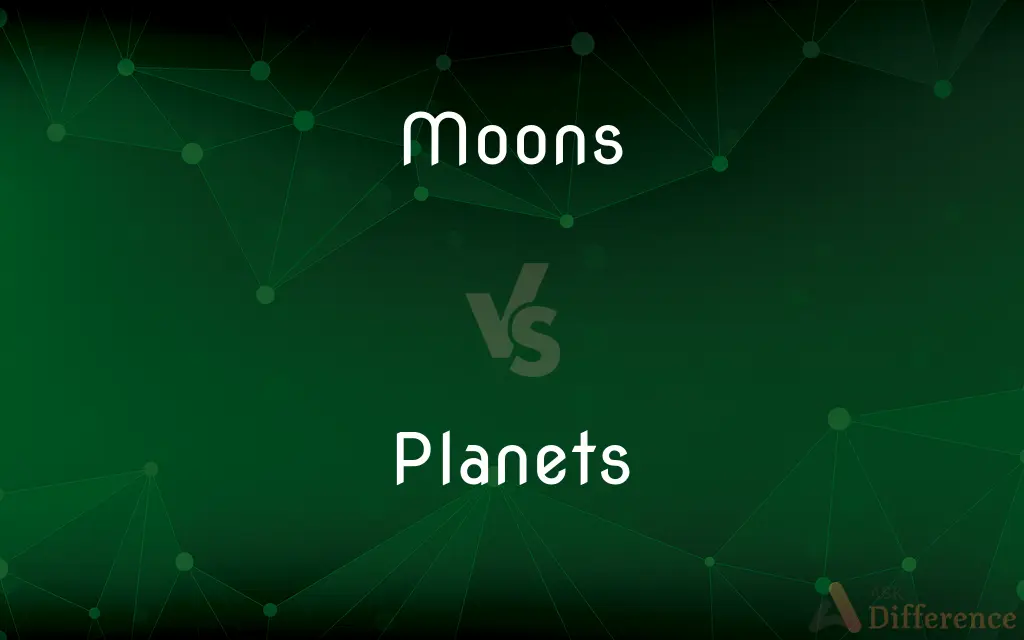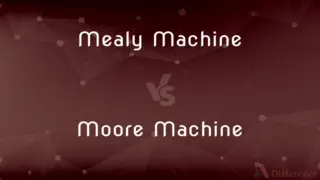Moons vs. Planets — What's the Difference?
Edited by Tayyaba Rehman — By Fiza Rafique — Published on January 8, 2024
Moons are natural satellites orbiting planets, whereas planets are celestial bodies orbiting stars, larger and independent in their orbits.

Difference Between Moons and Planets
Table of Contents
ADVERTISEMENT
Key Differences
Moons are natural satellites orbiting planets. Planets are larger celestial bodies orbiting stars.
Moons often have irregular shapes; planets are generally spherical due to gravity.
Moons are dependent on planets' gravity. Planets orbit stars independently.
Moons vary in size, but are smaller than planets. Planets can support moons and have defined orbits.
Moons may have no atmosphere. Planets often have atmospheres, some supporting life.
ADVERTISEMENT
Comparison Chart
Orbital Characteristics
Orbit planets
Orbit stars
Size and Shape
Smaller, often irregular shapes
Larger, generally spherical
Dependency
Dependent on planets' gravity
Independent in their orbits
Atmospheric Presence
Often lack atmospheres
Often have atmospheres, some with life
Variability
Vary greatly in size and composition
Have defined orbits and classifications
Compare with Definitions
Moons
Natural satellites of planets.
Earth's moon influences ocean tides.
Planets
Celestial bodies orbiting stars.
In our solar system, eight planets orbit the Sun.
Moons
Often smaller and irregularly shaped.
Some of Jupiter's moons are oddly shaped.
Planets
Generally spherical due to gravity.
Planets like Earth are round because of gravitational forces.
Moons
Vary in size and composition.
Saturn's moons range from tiny to Titan, its largest.
Planets
Independent in their orbits.
Each planet in the solar system follows its unique path around the Sun.
Moons
Often Moon The natural satellite of Earth, visible by reflection of sunlight and having a slightly elliptical orbit, approximately 363,100 kilometers (225,600 miles) distant at perigee and 405,700 kilometers (252,100 miles) at apogee. Its mean diameter is 3,475 kilometers (2,159 miles), its mass approximately one eightieth that of Earth, and its average period of revolution around Earth 29 days 12 hours 44 minutes calculated with respect to the sun.
Planets
Often have atmospheres.
Planets like Venus have thick atmospheres.
Moons
A natural satellite revolving around a planet.
Planets
Can support moons.
Jupiter supports numerous moons due to its large size.
Moons
The moon as it appears at a particular time in its cycle of phases
A gibbous moon.
Planets
In the traditional model of solar systems, a celestial body larger than an asteroid or comet, illuminated by light from a star, such as the sun, around which it revolves.
Moons
A month, especially a lunar month.
Planets
A celestial body that orbits the sun, has sufficient mass to assume nearly a round shape, clears out dust and debris from the neighborhood around its orbit, and is not a satellite of another planet.
Moons
A disk, globe, or crescent resembling the natural satellite of Earth.
Planets
One of the seven celestial bodies, Mercury, Venus, the moon, the sun, Mars, Jupiter, and Saturn, visible to the naked eye and thought by ancient astronomers to revolve in the heavens about a fixed Earth and among fixed stars.
Moons
Moonlight.
Planets
The collection of life forms supported on Earth
An asteroid that threatened the whole planet.
Moons
Something unreasonable or unattainable
They acted as if we were asking for the moon.
Planets
People as a whole; humankind or the general public
The entire planet was affected by the global recession.
Moons
(Slang) The bared buttocks.
Planets
One of the seven revolving astrological celestial bodies that in conjunction with the stars are believed to influence human affairs and personalities.
Moons
To wander about or pass time languidly and aimlessly.
Planets
Plural of planet
Moons
To yearn or pine as if infatuated.
Moons
(Slang) To expose one's buttocks in public as a prank or disrespectful gesture.
Moons
(Slang) To expose one's buttocks to (others) as a prank or disrespectful gesture
"threatened to moon a passing ... camera crew" (Vanity Fair).
Moons
Plural of moon
Moons
Infl of moon
Moons
Lack independent orbits.
Moons are bound by their planets' gravitational pull.
Moons
May not have atmospheres.
Many moons, unlike Earth's, lack an atmosphere.
Common Curiosities
Can moons have their own moons?
Typically, moons don't have their own moons due to gravitational dynamics.
How do planets differ in composition?
Planets can be terrestrial, like Earth, or gas giants, like Jupiter.
What determines a planet's orbit?
A planet's orbit is determined by the gravitational pull of its star.
What's the difference in size between moons and planets?
Planets are generally much larger than moons.
How are planets classified?
Planets are classified based on their orbits, composition, and other characteristics.
What are planets?
Planets are celestial bodies orbiting stars.
Why don't all planets have rings?
Planetary rings form under specific conditions, not present for all planets.
Do all planets have moons?
Not all; Mercury and Venus, for example, have no moons.
What are moons?
Moons are natural satellites that orbit planets.
How do planets form?
Planets form from the accretion of material in a star's protoplanetary disk.
Are there moons bigger than some planets?
Yes, some moons, like Ganymede of Jupiter, are larger than Mercury.
Can moons affect their planets?
Yes, moons can affect tides and even the stability of a planet's rotation.
Can moons sustain life?
Most moons are inhospitable, but some, like Jupiter's Europa, might have conditions suitable for life.
Can planets exist without stars?
Yes, rogue planets can exist without orbiting a star.
Do all moons look the same?
No, moons vary widely in appearance, size, and composition.
Share Your Discovery

Previous Comparison
Chlorhexidine vs. Chloroxylenol
Next Comparison
Mealy Machine vs. Moore MachineAuthor Spotlight
Written by
Fiza RafiqueFiza Rafique is a skilled content writer at AskDifference.com, where she meticulously refines and enhances written pieces. Drawing from her vast editorial expertise, Fiza ensures clarity, accuracy, and precision in every article. Passionate about language, she continually seeks to elevate the quality of content for readers worldwide.
Edited by
Tayyaba RehmanTayyaba Rehman is a distinguished writer, currently serving as a primary contributor to askdifference.com. As a researcher in semantics and etymology, Tayyaba's passion for the complexity of languages and their distinctions has found a perfect home on the platform. Tayyaba delves into the intricacies of language, distinguishing between commonly confused words and phrases, thereby providing clarity for readers worldwide.












































